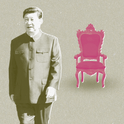For more than a decade, the question of intervention has been the most important issue in international politics. When if ever is it right to attack a state that has not itself attacked another state? And is the explicit authorisation of the UN security council essential before such an attack can be legitimate? Since the US carved out a safe area for the Kurds in northern Iraq in April 1991, theory and practice have shadowed each other through actions taken and not taken in Somalia, Bosnia, Rwanda, Kosovo, East Timor, Afghanistan and most recently Iraq again and Sudan.
Armed intervention in such circumstances is controversial - as Robert Skidelsky wrote in last month's Prospect - because it is seen as a departure from the ground rules of the international system as envisioned in the UN charter. Skidelsky says that

Of course, it is desirable for any country that is about to attack another to ask itself whether recourse to war is truly justified. But when has anyone set out to make the case for an unjust war? All wars fought by modern liberal states (and not only by them) are represented by their advocates as morally justified. Skidelsky makes a plausible case that the Iraq war failed to meet the just war threshold, but there were also some just war theorists on the other side. The neoconservative Catholic Michael Novak was so persuaded that an attack on Iraq was justified that he tried to win over the Pope.
Just war theory is, in Skidelsky's words, "an invitation to moral argument." It can set the framework for debate within a political community about the legitimacy of going to war, but it is too malleable to provide a stable foundation for international order without an arbitrating institution to decide on the merits of competing claims. It was this desire to remove decisions about the legitimacy of the use of force from national governments that lay behind the design of the UN system. Under international law, the "legitimate authority" to declare war has passed from states to the UN security council. Since legitimate authority is an essential criterion of just war, the idea that one nation can invoke just war theory to attack another without UN backing (always excepting self-defence) verges on self-contradiction.
Yet the security council does not carry conviction as an effective and plausible arbiter of when intervention is justified. The reason for this does not lie primarily (pace Skidelsky) in the limitations of its mandate. The council is free to interpret the notion of a "threat to the peace" however it wishes, and when the political will has been there it has interpreted it to allow intervention in situations of internal conflict or humanitarian emergency. In 1992, the security council determined that "the magnitude of the human tragedy caused by the conflict in Somalia" constituted a threat to international peace and security. By contrast, when the security council failed to act to stop the Rwandan genocide, this was because it did not suit the political interests of the great powers. In fact, Rwanda is a good example of the way that "internal" conflicts can pose a genuine threat to international order, since the genocide touched off a series of consequences that led directly to a war in Zaire (or the Democratic Republic of Congo as it became) in which 2-3m people died.
The real problem is that the security council is anything but a morally principled and consistent body. It acts not on a fine determination of justice but according to the interests of its members, some of whom retain a strong attachment to the principle of sovereign inviolability. The recent report of the high-level panel appointed by Kofi Annan to advise on the UN's future acknowledges this fact by saying that security council decisions in this area need to be "better made, better substantiated and better communicated." It says that the effectiveness of the UN global security system depends on a perception that security council decisions "are made for the right reasons, morally and legally."
This is clearly right - but the panel has, not surprisingly, failed to come up with recommendations for action that match the cogency of its diagnosis. Following Skidelsky, and the "Responsibility to Protect" report that he refers to, the panel endorses the "emerging norm" of a "collective international responsibility to protect" and recommends that the security council adopt formal guidelines to determine when it should authorise intervention. At a time when the UN has been unable to agree any effective response to the ethnic cleansing (and according to the US, genocide) in Darfur, it is hard to believe that the adoption of new guidelines could have an impact on the blunt considerations of national interest that lie behind the security council's paralysis.
The tension in the international system can be expressed as a disjunction between the procedural legitimacy attached to decisions of the security council and the substantive moral imperative that many people feel to intervene when mass atrocities are taking place. In Kosovo, Nato acted outside the security council for humanitarian purposes in a way that has been described as "illegal but legitimate." But to many internationalists, the idea that legitimacy can be achieved without security council authorisation looks less appealing following the invasion of Iraq. Gareth Evans, the former Australian foreign minister and one of the co-authors of the "Responsibility to Protect" report, wrote that his idea had been "almost choked at birth" by the Iraq war. The panel on the UN declared that the use of force that was not both legal and legitimate would weaken the international system.
Whether viewed from the perspective of the security council or the nation state, just war theory does not offer an effective way of bridging the procedure/substance divide. The likelihood is that intervention will continue to take place (with or without security council backing) on an ad hoc basis when there is a sufficient critical mass of opinion and power behind it and the political circumstances are favourable. However for both bad reasons (the divided west and the fallout from Iraq) and good (a sober realisation of the difficulties of nation-building), military intervention may be starting to slip down the international agenda - both as a theoretical question to be resolved, and as a way of dealing with the problems that seem most urgent in world affairs.










